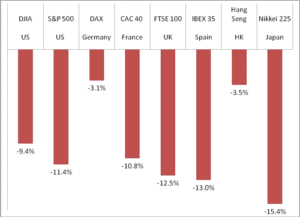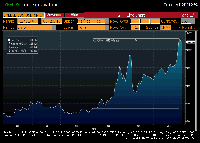Beware of Greeks Bearing Debt
What started as a Greek specific crisis in early 2010 spilled over to Europe and beyond in May as investors reduced risk across the globe signaling their lack of faith that government measures will sustain economic growth. Consequently, all of the major stock markets around the world dropped meaningfully in the second quarter ended June 30th as shown below. Returns in USD were about 5% lower for European markets.
Exhibit 1 Major Global Stock Markets 2Q2010 Returns

2Q Reversal Three months ago, the world seemed a safer place. That was before BP’s tragic oil spill, before the Euro scare, and before fading economic momentum. The oil spill may take years to clean up, the Euro years to clear up, and vigorous economic growth years to show up. First quarter earnings for companies in the S&P500 were strong with positive surprises ahead of negative ones by 4:1, according to Bloomberg statistics. Early 1Q GDP growth estimates showed a moderate 3% but was later revised to 2.7% (source: Bloomberg). That rate of growth, if sustained, would be welcome for investors. The market’s collective concern is that massive sovereign debt will need to decline amidst a fragile global recovery. A transition from a government stimulated post bubble economy to one driven by private sector growth would likely be challenging even if the regulatory and tax environment is business friendly. Recent legislative efforts are disappointing in this regard and will make it harder for this transition to occur.
One step forward, one step back? Volatility is back. The market has travelled from optimism to pessimism; from bullish to bearish. After a brief rally to start 2010, the stock market “corrected”, dropping 8% before climbing 15% by late April. Then came the infamous “flash crash” when the S&P lost 4.7% on May 6th amid an apparent panic selling. Experts speculated that a trading error and/or problems with automated trading systems were to blame. Regardless of cause, a subsequent 3 day rally that recovered those losses failed to hold as weaker economic reports (higher jobless claims) and concern grew that the evolving European debt crisis would derail global growth. The VIX (a measure of options volatility commonly described as the fear index) jumped 45% in May as the S&P 500 index dropped 7.05% for the month. Stocks rebounded 6% in mid June before renewed selling drove the S&P 500 index to its lowest level of the year at June 30th. We have recently reduced our stock allocations in our discretionary accounts ahead of further economic evidence that the economy will avoid a “double-dip” (another recession). Should stock valuations decline further without clear evidence of stagnant economic activity or if economic growth strengthens we will consider increasing our stock allocation. US stock valuations, as measured by prices relative to forward earnings estimates (P/E) going into 2Q earnings releases are a low 12.7 times (as per Bloomberg L.P.). Conversely, if evidence of substantive economic weakness transpires, we will consider reducing stocks further (as earnings estimates would likely decline).
Greek Drama Exhibit 2 Greece CDS Senior Debt 5 yrs USD

Greece is struggling to harness a large fiscal deficit, high debt, and weak tax regime that render it outside the European Union’s (EU) parameters for inclusion. It has agreed to austerity measures (reduced its budget and cut public wages and pensions) to regain compliance with EU standards. Exhibit 3 shows what investors are paying to insure their exposure to a possible Greek default (as measured by 5 year credit default swaps or CDS).
Why should anyone care? If Greece defaults, pressure would grow on other European countries with large debt obligation (Spain and Portugal) and the Euro currency would likely weaken and potentially disband. In a global system that has cross market investments and loans, fears that another systemic financial crisis was possible (similar to the fall of 2008) would possibly lead to lower equity markets.
What do we think? Uncertainty about the economy and the European markets will eventually abate. However, high public sector debt across major global economies will continue to pose significant head winds to economic growth for a number of years. Fortunately, corporate America has a fairly high level of liquidity and low debt that along with operating efficiencies should protect earnings in a soft economy and grow them meaningfully in a stronger one.
Our goal remains to try to deliver competitive returns with below average risk, thus being effective stewards of your money. By God’s grace, and using state of the art tools to research and report information, we are privileged to work in partnership with an expanding, superior client base.
Thank you for your continued trust in Regency Wealth Management.
Mark D. Reitsma, CFP®, CMFC Andrew M. Aran, CFA
The opinions voiced in this material are for general information only and are not intended to provide specific advice or recommendations for any individual. To determine which investment(s) may be appropriate for you, consult your financial advisor prior to investing. All performance referenced is historical and is no guarantee of future results. All indices are unmanaged and cannot be invested into directly.
Regency Wealth Management is a SEC Registered Investment Advisor managing over $500 million for families and small institutional investors. Regency was founded in 2004, is headquartered in New Jersey, and serves clients across the country.
